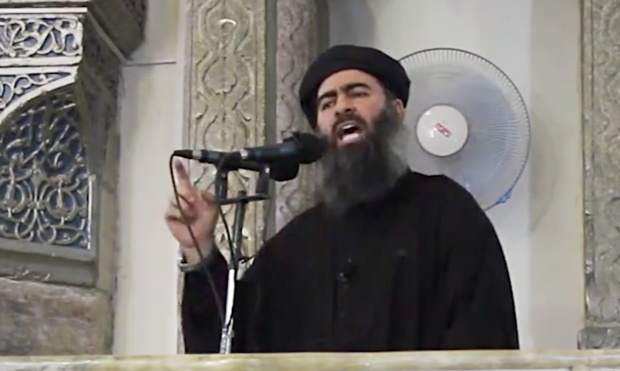Jason Burke, The Guardian 24 August 2014
What Baghdadi has done is fuse the political Islamists’ aim of seizing power with the neo-traditionalists’ more global vision.
Just under a decade ago, a battered militant group then known as al-Qaida in Iraq decided it needed rebranding. A new structure and name were introduced to a sceptical public. The formation of the Islamic State of Iraq, complete with designated ministers, was announced.
The ISI’s leaders lacked credibility and its supposed administrative structure lacked substance. That the “state” in the title was nothing more than an aspiration was clear to all. But the scepticism with which the ambitious name was once greeted is now looking misplaced. The ISI eventually evolved into the Islamic State, which now controls a swath of land from western Syria to western Iraq running religious schools, bakeries and power plants, exporting oil, levying taxes and organising parades of tanks, a potent overseas outreach operation and fighting a war on several fronts.
The declaration by Abu Bakr al-Baghdadi, the leader of this new entity, that he is the supreme authority of a new “caliphate” makes it easy to portray the Islamic State as a reactionary throwback. But this is an error. Baghdadi’s vision is profoundly contemporary.
It is also a radical break with the strategic vision of previous militant leaders. Political Islamists such as the Muslim Brotherhood and their offshoots have long talked of appropriating institutions and power, by a variety of means ranging from peaceful social activism to a violent coup d’etat, but never about creating a new state. Neo-traditionalists of the Salafi strand of hardline Islam have tended to see the modern state as anathema, an irreligious innovation that has divided the world’s Muslim community. When confronted with the necessity of actually running a state, the response is a mix of bewilderment and incompetence.
Seventh-century scriptures are no substitute for administrative or technological expertise, as I witnessed when reporting from Taliban-controlled Afghanistan in the 1990s. A slogan daubed on the wall of one ministry read: “Throw reason to the dogs. It stinks of corruption.” A catchy phrase, perhaps, but not particularly useful when setting up a sanitation system, finding cash to pay civil servants or maintaining order.
Osama bin Laden often spoke of a caliphate, a single politically and religiously united realm covering the extent of the Islamic empire at its height. But beyond the mobilisation and radicalisation of hundreds of millions of Muslims through a campaign of spectacular violence, he offered no real strategy as to how the new caliphate might be created or governed. It was understood to be a distant aspiration, not a concrete midterm goal. What Baghdadi has done is fuse the political Islamists’ aim of seizing state power with the neo-traditionalists’ more global vision to create a recognisable if rough-edged state that is simultaneously supposed to be a launchpad for greater expansion. This unprecedented combination is a powerful one.
Optimists hope – and they may well eventually be proved right – that the new Islamic State rests on very flimsy foundations. Their expansion has been extremely rapid, they say, and will overstretch resources that are slimmer than they appear from overseas. Isis’s extreme violence and rigorous conservative value system will alienate local communities, they argue, and their avowed ambitions will provoke a regional and international response that will eventually weaken and destroy them. Some point to the example of the Taliban, ousted after al-Qaida launched strikes against the US from Afghanistan about which the movement’s leaders knew virtually nothing.
Others cite the reaction against al-Qaida in Iraq in the west of that country in 2005 and 2006, when Sunni tribes turned against Baghdadi’s predecessors on account of their violence, insensitivity and lack of respect for local vested interests. Yet Syria and Iraq today constitute an immeasurably more complex operational environment than Afghanistan did in 2001 and the Awakening fighters who took on al-Qaida could do so because the US army was there to provide protective firepower. Anyone trying something similar in ar-Raqqa or Mosul right now would not last long.
Even the Taliban, which clearly benefited, too, from very specific local circumstances, might well have maintained their grip on much of Afghanistan for a much longer period were it not for the adventurism of al-Qaida. Though very different from Isis in many ways, Hamas and Hezbollah, both organisations that have combined non-violent social and religious activism with violence and which, in part or entirely, are considered terrorist groups by many powers, have survived for three decades.
There is a further reason to fear Isis may be a more durable construction than some hope. A decade and a half ago the contrast between the capabilities and structure of an organisation such as Baghdadi’s and states in the Middle East would have been dramatic. Militant activity in Iraq or Syria was small scale, fleeting and mercilessly tracked by dictators. Now, in the context of the Syrian civil war and a destabilised Iraq, as well as a regional context of ferment and change, the gap between informal and formal powers in the Middle East is narrower than before.
The leader of Isis has a few million fractious people of differing tribes and communities to rule. His main immediate focus is security and military operations. He has a shadowy range of overseas backers and is caught in a broader regional struggle for power. Almost incomprehensible brutality is an integral element of his way of exercising power, terrorising opponents and attracting supporters. If Baghdadi’s new state were an anachronism, it would pose little threat. It is not, however. It is, tragically, very much of its time and place and much stronger for it.
Jason Burke is the author of Al-Qaeda: The True Story of Radical Islam

